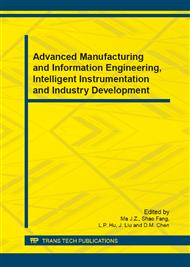[1]
Yan HS, Liu F. Knowledgeable Manufacturing System—A New kind of Advanced Manufacturing System [J]. Computer Integrated Manufacturing Systems, 2001 7(8) 7-11.
Google Scholar
[2]
Omkumar M, Shahabudeen P. Ant Colony Optimization for Multi-level Assembly Job Shop Scheduling [J]. International Journal of Manufacturing Research, 2009 4(4) 410-427.
DOI: 10.1504/ijmr.2009.028538
Google Scholar
[3]
Wong TC, Ngan SC. A Comparison of Hybrid Genetic Algorithm and Hybrid Particle Swarm Optimization to Minimize Makespan for Assembly Job Shop [J]. Applied Soft Computing 2013 13(3) 1391-1399.
DOI: 10.1016/j.asoc.2012.04.007
Google Scholar
[4]
Pereira MT, Santoro MC. An Integrative Heuristic Method for Detailed Operations Scheduling in Assembly Job Shop Systems [J]. International Journal of Production Research, 2011 49(20) 6089-6105.
DOI: 10.1080/00207543.2010.527385
Google Scholar
[5]
Natarajan K, Mohanasundaram KM, Shoban BB, et al. Performance Evaluation of Priority Dispatching Rules in Multi-level Assembly Job Shops with Jobs Having Weights for Flowtime and Tardiness [J]. International Journal of Advanced Manufacturing Technology, 2007 31(7-8) 751-761.
DOI: 10.1007/s00170-005-0258-8
Google Scholar
[6]
Xie ZQ. Study on Operation Scheduling of Complex Product with Constraint among Jobs [D]. Harbin: Harbin University of Science and Technology, (2009).
Google Scholar
[7]
Ovacik IM, Uzsoy R. Rolling Horizon Procedures for Dynamic Parallel Machine Scheduling with Sequence-dependent Setup Times [J]. International Journal of Production Research, 1995 33 (11) 3173-3192.
DOI: 10.1080/00207549508904867
Google Scholar
[8]
Clark AR, Clark SJ. Rolling-horizon Lot-sizing When Set-up Times are Sequence-dependent [J]. International Journal of Production Research, 2000 38(10) 2287-2307.
DOI: 10.1080/00207540050028106
Google Scholar
[9]
Keshavarz T, Salmasi N. Makespan Minimisation in Flexible Flowshop Sequence-dependent Group Scheduling Problem [J]. International Journal of Production Research 2013 50(20) 6182-6893.
DOI: 10.1080/00207543.2013.825055
Google Scholar
[10]
Prabhaharan G, Asokan P, Ramesh P, et al. Genetic-algorithm-based Optimal Tolerance Allocation Using a Least-cost Model [J]. International Journal of Advanced Manufacturing Technology, 2004 24(9-10) 647-660.
DOI: 10.1007/s00170-003-1606-1
Google Scholar
[11]
Wang LP, Jia ZY, Wang FJ, et al. Job-shop Scheduling Problem Incorporating Assembly Constraint and Its Solution using Genetic Decoding Approach [J]. Journal of Dalian University Technology 2010 50(4) 535-539.
Google Scholar


